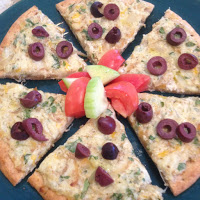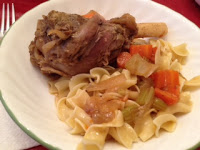
A great email arrived the other day from reader Tom Merjanian, who was nice enough to relay a few kind words about this site and to take the time to share some Armenian names for recipes we’ve posted.
As you know from a recent post on the topic, we’re in a bit of a quandary when it comes to such things. We don’t speak Armenian, and even friends and relatives who do speak Armenian often mix-in Turkish, Greek, Persian or Russian food terms.
Tom is among those who feel strongly that Armenian food is best tasted with the mother tongue, and he is particularly averse to using Turkish names.
“Since these people still will not admit to the world to their heinous crime, I avoid using their language as much as possible,” he wrote.
For example, he notes that we call pickled vegetables tourshou, which is Turkish.
“Pickles in Armenian is TUTVASH. The root word is tutu or tutoo …meaning sour. Assortment of pickles – TUTVEGHEN.”
He contiued: “Sarma? Oh, No! PATTOTZ. Pattel is to wrap. The suffix ‘otz’ indicates ‘the place in which something occurs.’ Dolma? Oh, no! LITZK or LEETZK. The verb is ‘letzunel’ meaning to fill. The ‘K’ suffix is the ancient Armenian (Krapar) plural suffix.”
Tom, thanks for the Armenian lesson!
He promises to send more as examples arise, and we welcome the contribution and applaud the effort.
Meanwhile, we’ll also continue using common terms of whatever origin because we think they’re what many of you also use and recognize.
As I’ve written before, we try hard to keep politics out of the kitchen. But Tom raises an issue that Armenians feel strongly about, although we sometimes differ on how best to achieve our goals.
Strictly my opinion: I feel as passionately about The Genocide as anyone, but my quarrel is with the Turkish government and its allies in politics and business (shame on you, Chevron) who continue to deny history.
I have no quarrel with Turkish people, however, and no objection to Turkish food or the Turkish language.
As I said, strictly my opinion.
What do you think? — Doug Kalajian





I have to admit I am torn on the subject. You would never catch a Frenchman calling pommes frites "French fries", so why not call yakhneli keufta by its Armenian name "cherot glolag"? On the other hand, considering the centuries of "bleeding" that occurred between the Armenian, Turkish, and Kurdish cuisines, maybe it does not matter after all.
I do try to use the Armenian words for common items like tutvash. When it comes to dishes like "tzeknakanchi pattots", however, I find myself slipping and using the shorter "midia dolma". But what to do about dishes with names in regional dialects that are 50% Turkish to begin with…?
On the whole, I think it is a lot more important to promote and practice the cooking of "pure" Armenian foods and cooking styles. It is also paramount to dispel the astonishing opinion held by many diaspora Armenians that "there is no Armenian cuisine". And it would be lovely to open a restaurant that served real Armenian food (as opposed to hummus, tabbuleh, and kebab), though of course, I would hire somebody else to do all the cooking, be there seven days a week, etc.
Recently, eloquent journalist Robert Fisk wrote about how the Turks did much to "Turkify" Armenian women and children … including transferring people from one group to another for the purpose of eradicating their ethno-racial-religious ties (considered a severe symptom of the genocidal process).
Fisk's heartbreaking article:
http://www.independent.co.uk/news/world/middle-east/living-proof-of-the-armenian-genocide-1918367.html
As you'll see, Fisk talks about forbidding the use of the Armenian language during this "conversion" process. While the constant threat of our extinction (as a people, as a language) gives us much reason to use the mother tongue as often as possible, let's also remember that Turks "borrowed" words liberally from, for example, Persian, Arabic, and YES even the Armenian. As Armenian-American U.S. Colonel Harry Sachaklian once said (he was stationed in Turkey for many years), knowledgeable Turks themselves will admit that those words inherently Turkish are military terms (think of the invading hordes) … the rest were borrowed. Some words we think are Turkish in origin alas may have roots in the Armenian tongue. "Food" for thought!
this just made think about the armenian language and how it had to be repurified. it had taken so many persian words that at one point it was considered a dialect of persian. in light of this, tom perhaps makes good point.
i know armenian foods by their turkish names because that's how they were introduced to me by my grandparents who, as you might guess, are not fond of turks. however, sometimes they would tell me, for example, "call it zailou, not choereg, that's the armenian name!" even though they still mainly refer to it as choereg.
the thing about food is that it will always have foreign names because each type of food has a discrete center of origin. for example, eggplant-a fruit much loved by armenians, is originally from india. there it is called baingan (among other things) as it traveled through trade routes the name changed slightly as different ears heard differently. but it is clearly still rooted in the indian word. it went something like this: india-persia: bademjaan, perisa to arabia: bathinjan, turkey: patlican, moors to spain: berenjena, to france aubergine. you can see these are corruptions of the original indian name. interestingly, the armenian word, which i'm not sure armenians are aware of, is simpoog which is unique.
i guess the point i'm trying to make is that there is no such thing as authentic cuisine because things change. try to imagine italian food(or armenian food, for that matter) without tomatoes. all that marinara and everything else seems so italian. however, tomatoes come from mexico and were never seen in italy until the end of the fifteenth century at the earliest, so "italian food" evolved without tomatoes. likewise think about mexican food without cilantro (which is from the near east).
still i'm a proud armenian (sometimes too proud) and i take pride in the ownership of certain dishes. lavash pops up in fancy restaurants all over the country (usa) which warms the cockles of heart. i always tell whoever i'm with, "hey, that's armenian." Pakhlava, is another dish that i feel is armenian because paki (baki?) is the armenian word for lent(halva comes from arabic:halwa for sweet) and another unique aspect of armenian cooking is the combination of fruit and meat. for example i just made missov dziran (lamb and apricot stew) it was an overcast day which how i justified making a winter stew in the middle of summer, plus the lamb shoulder at the store looked so good.
anyways: everybody just keep enjoying what you about armenian cuisine and everything will be alright. thank you mr. kalajian for this website and the opportunity for discussion. i apologize for the long-windedness and i hope at least person is interested by some of this.
մնաս բարով
What we Armenians really need, I feel, is a Komitas for food. Just like Komitas purified Armenian music by finding its ethnic origins and stripping out Persian and Turkish influences, we need to find the original Armenian food and strip out the foreign influences. In the process, I think we may be surprised by how much influence we ourselves had on other cuisines.
The question, of course, is how to do it. Komitas had one advantage, at least. He was able to tour the villages and get the old songs directly from the mouths of the villagers. But how to get the old recipes after 100 years of genocide and living in a diaspora? Especially when we consider the extent to which Armenian cuisine is dependent on local herbs and plants, many of which are unique to our historic homeland…
Some of my best friends in Greece were Armenian and I am half Azeri. The Young Turks was a bourgeoisie organisation staffed by many nationalities with the common interest of a state and a free market to suit their interests. Please, oh please, don't let our people be divided any longer. My state does not represent my interests as a working class citizen.